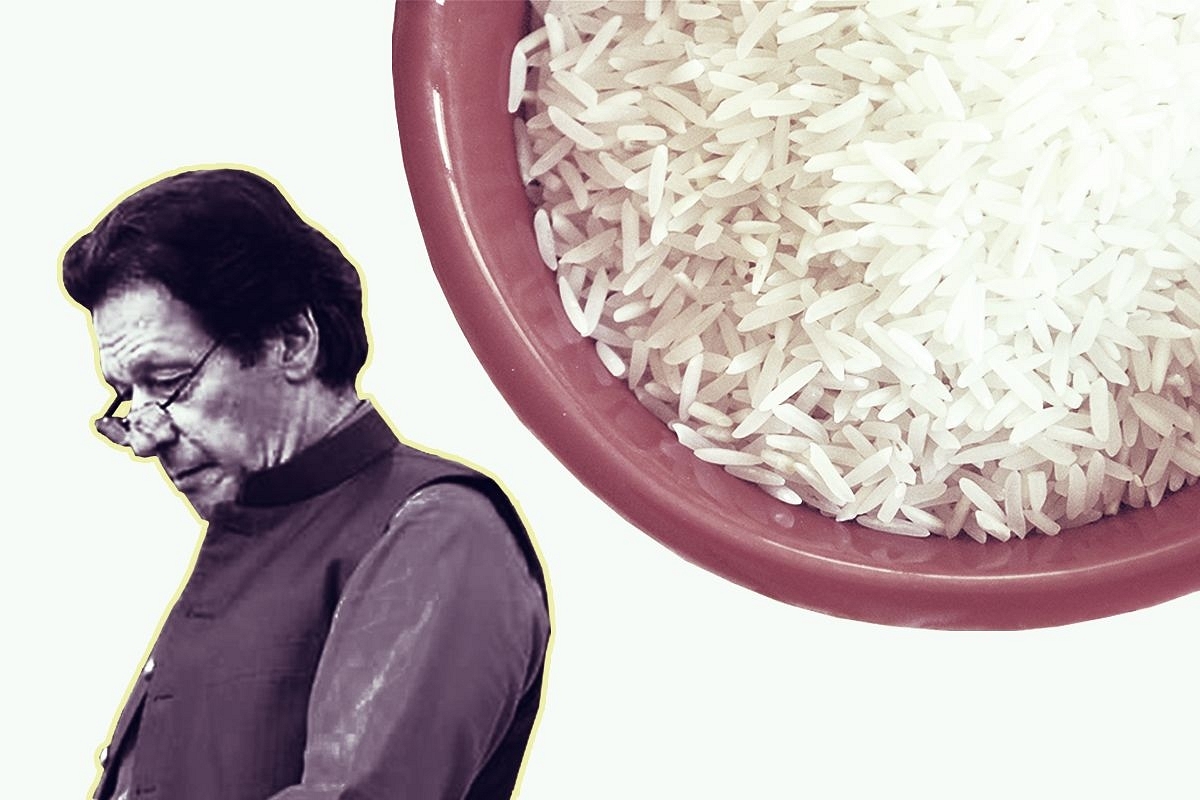Business
Pakistan's Efforts To Capture Indian Basmati Market In Iran Might Backfire As Tehran Runs Out Of US Dollars
- There is an issue with receipt of payments from Iran due to banking reasons.
- Media reports said this is primarily because Central Bank of Iran is delaying allocation of the currency in which Iranian traders buy basmati rice and tea.

Pakistan Prime Minister Imran Khan.
Pakistan’s battle against India has now extended to the basmati rice export market. But it could land the former's exporters in a mess.
No doubt, India has put Islamabad on the backfoot by applying for Geographical Indications (GI) tag in the European Union where Pakistan had been enjoying an edge till now.
The Indian basmati variety enjoys a premium in the global market for its fragrance, long grain and with New Delhi certifying its genuineness.
Pakistan has been slow to get these things done for its growers and it has even resulted in one grower claiming trademark rights for the fragrant rice from that country.
In these circumstances, Pakistan is now trying to gain a foothold in Iran, a traditional market for India which accounts for the country’s 34 per cent basmati exports.
According to Pakistan veteran journalist Muhammad Ziauddin, Iran is in the process of shifting its basmati rice import from India to Pakistan.
This shift is being done by basmati traders in Iran but given the payment problems that exporters from India and other countries are facing with Tehran, Pakistan exporters and growers could be in for trouble.
According to the All-India Rice Exporters Association (AIREA), basmati exports to Iran dropped in the first four months of the current fiscal. The drop in exports comes along with a fall in the prices for the fragrant rice in view of higher production this year.
India produces some 7.5 million tonnes of basmati rice of which nearly 4.5 million tonnes are exported.
Indian Tea Exporters Association Chairman Anushman Kanoria told The Hindu BusinessLine that there is an issue with receipt of payments from Iran due to banking reasons.
Media reports said this is primarily because Central Bank of Iran is delaying allocation of the currency in which Iranian traders buy basmati rice and tea.
This let to Indian exporters not entering new contracts for the last two months.
In June this year, AIREA said that 2.5 lakh tonnes of basmati rice valued at Rs 1,700 crore got stuck at Iranian ports due to the payment problem. Previous payments are also pending from Iranian buyers, leading to the opening of new contracts.
The other issue on both sides is that the Iranian currency Rial had dropped to its lowest level against the US dollar in June this year. The Iranian currency has plunged in view of the sanctions imposed by the US against Tehran.
The US sanctions have affected exports of Iranian crude oil. Revenues from crude oil for Iran have plunged to $8 billion currently from $100 billion in 2011.
This has resulted in Tehran running out of dollars and being selective in its foreign exchange transactions.
Thus, for Indian basmati exporters the stoppage and fall in exports should be some relief amidst these problems.
In this situation, Pakistan’s attempts to fish in trouble waters could boomerang on its exporters and growers.
Though Islamabad might jump at the what looks like an opportunity for it, there is no guarantee that its exporters might not face problems that other exporters face due to the payment problems.
This, in turn, could leave them trapped in a piquant situation instead of really cashing in on an opportunity.
The issue for them is the uncertainty on part of Iran to find the money to pay Pakistan. Can Pakistan enter into some pact going against US sanctions, when Islamabad itself is facing financial problems?
Indian basmati growers might not have much to worry in view of the problem in the Iranian market. There are two reasons for this.
One, basmati prices are ruling far lower this year compared with last year. Currently, basmati paddy is quoting around Rs 1,900 a quintal (100 kg) in Punjab mandis, a drop of over 25 per cent from the same time last year.
This will help a higher offtake of the fragrant rice in the domestic market, which is price conscious.
With people still reluctant to move out of their homes due to coronavirus pandemic, demand for food products to be consumed at home is rising. This will stand in good stead for basmati rice too.
Two, this will result in the Indian rice being offered at a competitive price in the global market. In turn, the Indian rice could gain volume and market share, making up for the loss in the Iranian market.
Support Swarajya's 50 Ground Reports Project & Sponsor A Story
Every general election Swarajya does a 50 ground reports project.
Aimed only at serious readers and those who appreciate the nuances of political undercurrents, the project provides a sense of India's electoral landscape. As you know, these reports are produced after considerable investment of travel, time and effort on the ground.
This time too we've kicked off the project in style and have covered over 30 constituencies already. If you're someone who appreciates such work and have enjoyed our coverage please consider sponsoring a ground report for just Rs 2999 to Rs 19,999 - it goes a long way in helping us produce more quality reportage.
You can also back this project by becoming a subscriber for as little as Rs 999 - so do click on this links and choose a plan that suits you and back us.
Click below to contribute.
Latest